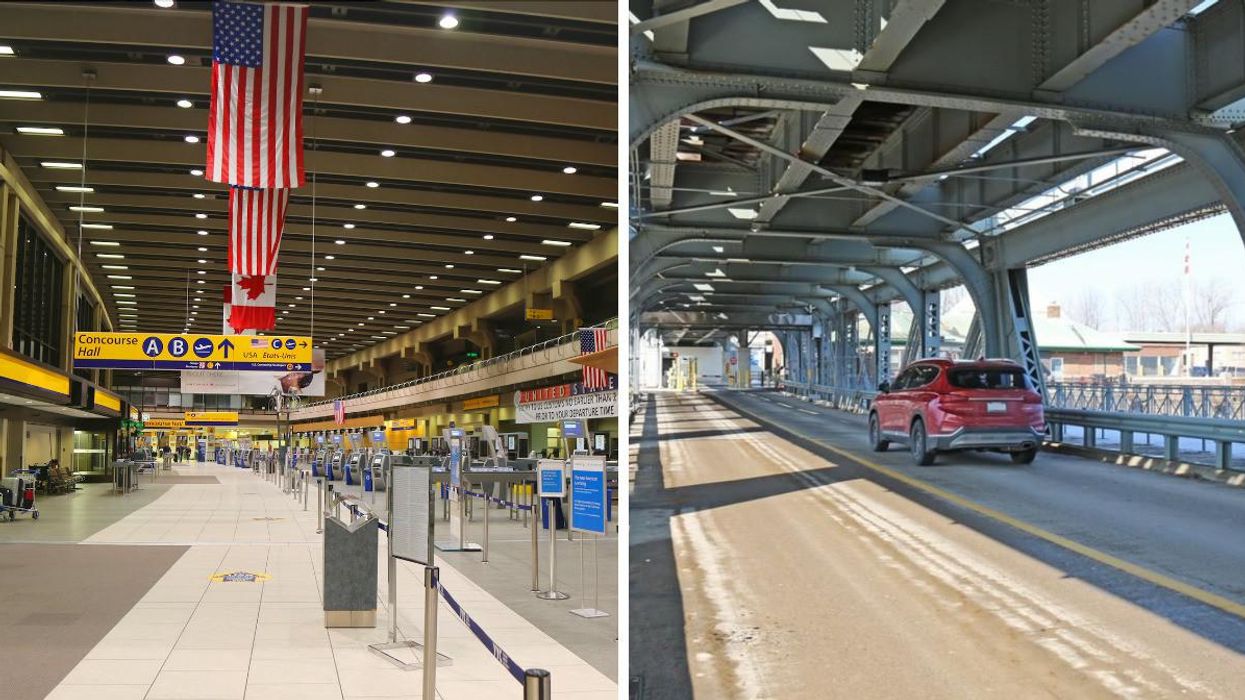The US Border Is Finally Fully Open But The CBSA Has A Reminder For Canadian Travellers
Travel restrictions on this side of the border aren't going anywhere just yet.👇
On Monday, November 8, the U.S. border reopened completely for the first time in 20 months, allowing fully vaccinated travellers to enter the country via land and air for non-essential purposes.
There are some travel restrictions still in place on the American side of the border, including a COVID-19 vaccine requirement and proof of a negative COVID-19 test for those travelling by plane, which must be taken within 72 hours prior to travel.
Rapid antigen tests, valid for entry to the United States, can be purchased from Walmart for less than $20 and Shoppers Drug Mart for $40, as well as at pharmacies across Canada.
However, entry requirements on the U.S. side of the border aren't the only travel restrictions Canadians need to consider before travelling.
In the days leading up to Monday's border reopening, the Canada Border Services Agency (CBSA) issued a reminder that "border measures remain in place for travellers entering or returning to Canada [...]"
The notice reiterated that all travellers entering Canada, regardless of vaccination status, must complete a mandatory pre-arrival molecular COVID-19 test within 72 hours before arriving.
Officials note that antigen tests, often known as rapid tests, are not accepted.
This rule even applies to those who are visiting other countries, including the U.S., for 72 hours or less. However, these travellers are permitted to take their pre-arrival molecular test before they leave Canada.
This rule has been a point of contention since the U.S. announced that it would fully reopen its borders, as molecular tests can be pretty costly to purchase.
However, speaking on November 5, Canada's top doctor confirmed that officials are to COVID-19 testing requirements at the Canadian border, particularly for short trips across the border.
Travellers who are unvaccinated or partially vaccinated must continue to take COVID-19 tests pre-arrival, on-arrival and on day eight post-arrival to gain entry into Canada. They are also subject to 14 days of quarantine.
Before you get going, check out our Responsible Travel Guide so you can be informed, be safe, be smart, and most of all, be respectful on your adventure.
- Officials Warn That The Canada-US Land Border Will Have Long ... ›
- US Border Restrictions Will Be Different Depending On Whether You ... ›
- 6 Things Canadians Should Remember Before Crossing The US ... ›
- Here's How To Check Canada-US Border Wait Times So You Don't Get Stuck In Line For Hours - Narcity ›
- Travellers Can Get Free COVID-19 Tests In The US & Some Canadians Are Using Them To Get Home - Narcity ›
- I Drove Across The Canada-US Border After Taking A PCR Test & This Is What You Need To Know ›
- The Conservatives Have Officially Called On Trudeau To Drop PCR Testing At Canada's Borders - Narcity ›
- An American Women Tried To Enter Canada With 56 Guns In The Trunk Of Her Car - Narcity ›
- The US Border Fully Reopens Next Week & Here's What You'll Need To Spend On COVID-19 Tests - Narcity ›
